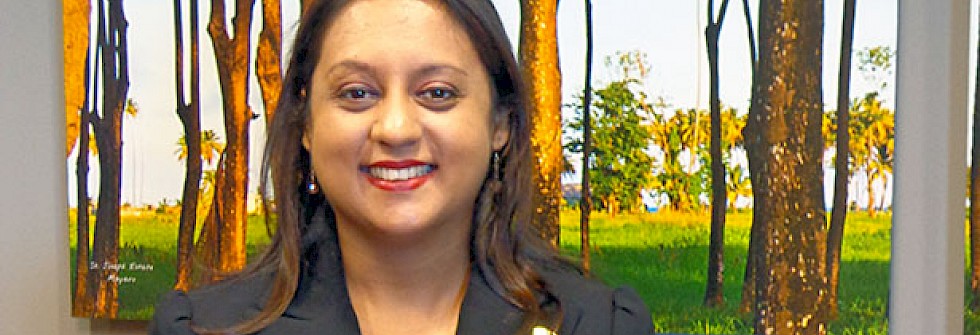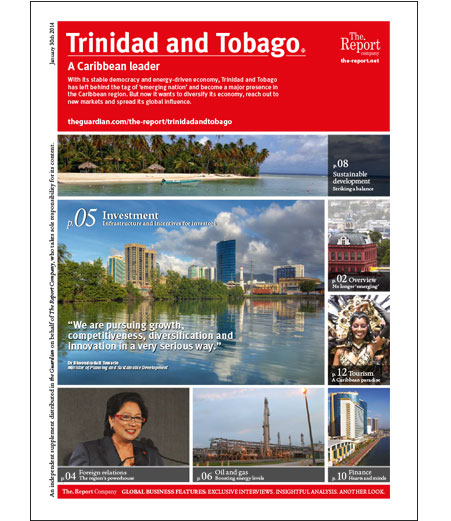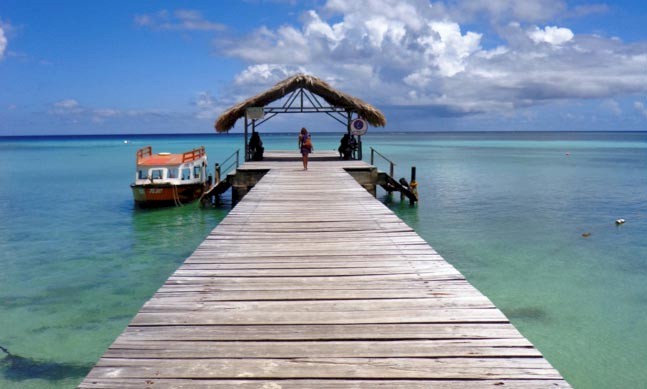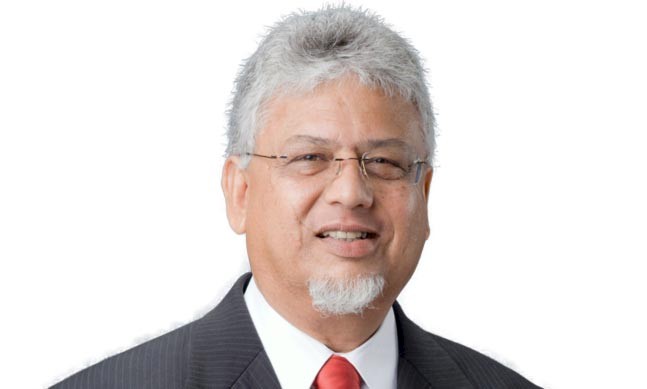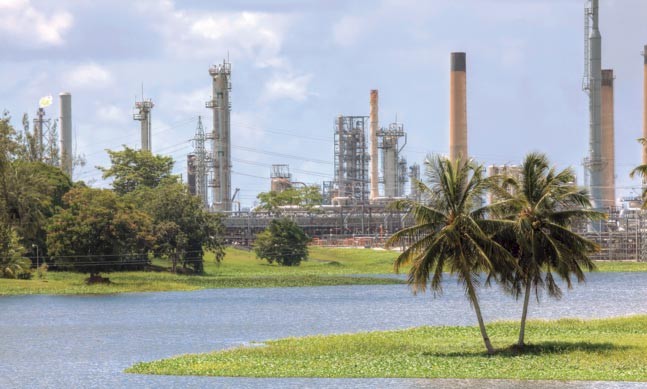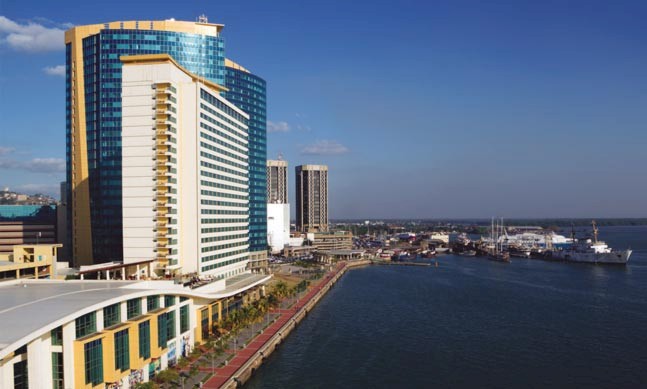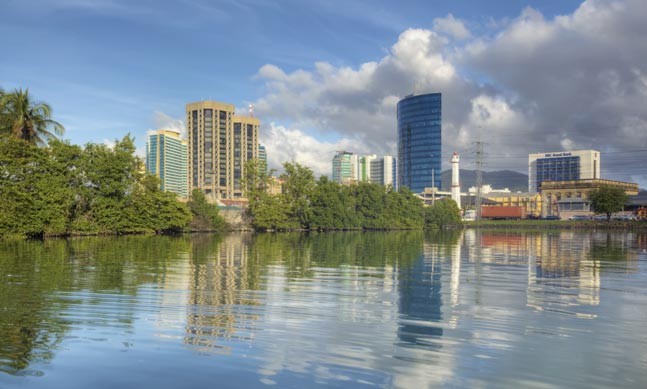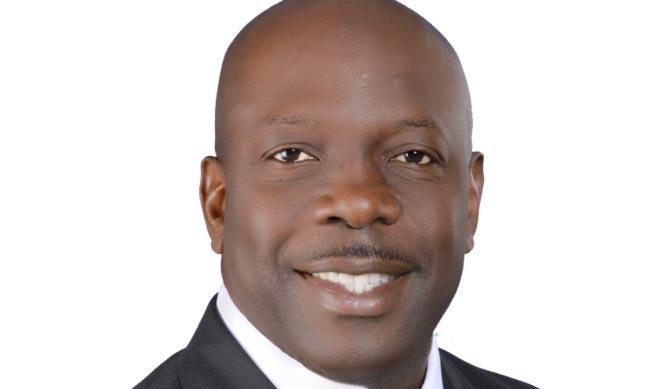Ramona Ramdial was first elected to parliament in May 2010, and took office as minister of state in the ministry of the environment and water resources in June 2012. She sat down with The Report Company to discuss the impact of climate change on Trinidad and Tobago, and the measures being taken to protect the environment against threats such as illegal quarrying and pollution.
The Report Company: The ministry of environment and water resources was created a little over a year ago. What was behind the creation of the ministry?
Ramona Ramdial: In the Caribbean region, the impact of climate change over the past years has been very severe and of course negative. We have experienced sea level rise and we have had erratic patterns in our weather, so in light of that we decided that we needed to create a ministry in order to deal with all our issues.
We decided to attach water resources to the ministry of environment because we see it as part of the sustainable environment. Looking at other models around the world, such as the Singaporean model, the New Zealand model and the UK model, we decided to bring in the agencies that deal with the environment under one ministry, so that we can deal with the environment in a holistic, aggressive manner.
TRC: What have been the main focuses and priorities for the ministry?
RR: First and foremost, the priority has been on the preservation and conservation of the general environment. We have had a number of issues arising in different sectors. For example, we are very famous here in Trinidad and Tobago for having leatherback turtles come and nest on our shores. However our coastal areas are so dynamic that in that particular area we have a river that threatens the stability of the beach every so often. It’s a 15-year event where you have the river being very aggressive in terms of our coastline and its outflows into the sea and it nearly completely destroys the beach. As a ministry we had to get in and do some damage control, for want of a better word. It was a huge public thing with the news because some of the measures that we took to preserve the beach somewhat ended up hampering the nesting of the turtles.
There’s a line that we walk; we try to protect the environment but then there are casualties associated to that. We have been able to do some good work and we continue to do our work in that area to preserve the nesting sites for the turtles
Another area where we have some problems is the hunting of our wildlife population. Even though we have a hunting season, we have the illegal hunters who are our biggest problem with respect to our wildlife. This year we have taken a decision to have a moratorium on hunting for at least two years so that we can see the wildlife population rejuvenate naturally.
Whilst we do that we have also partnered with the University of the West Indies where we have a professor who has done extensive studies on breeding in captivity so we’re also going to partner with him and set up some breeding areas.
We’re trying our best. The biggest problem with this ministry is enforcement and monitoring. We’re now starting to put systems and structures in place where we have proper enforcement and monitoring of our environment.
Another of our challenges is in the quarrying sector. It’s a lucrative industry and it brings in revenue for the government but we have to also look at the illegal quarries. They are a law unto themselves because they have the guns and the weapons and sometimes our policemen are faced with bullets. What we have done as a government is to go in with the army to clamp down. That has been very challenging but it has also been very successful to date. There are quite a lot more to crack down on, but it’s a work in progress.
TRC: What have been some of the most successful initiatives that you have put in place?
RR: We have had legislation laid in parliament via this ministry on the beverage container bill. This is about cleaning up the environment with respect to the plastic bottles and beverage containers. One of our major causes of flooding in our country is that of pollution and it is caused by those plastic containers.
We don’t have a recycling plant in Trinidad and therefore we have small NGOs who collect the plastic and export it to the Americas where they recycle it. It’s actually a very lucrative industry but it’s not enough to clean up the entire country, so this beverage container bill is going to act as an initial aggressive clean up with respect to the environment. There’s then a mechanism in place where we offer an incentive of money to collect the bottles.
It’s very costly to implement a recycling plant so what we may have to do is collect from the entire region and have all the other islands send their plastic containers to Trinidad and Tobago for recycling. We’re still looking at the cost benefit analysis to see whether or not it’s feasible to actually set up a recycling plant.
“We have a very aggressive policy towards ensuring water availability to all in Trinidad and Tobago. A lot of areas now have a 24/7 supply of water. One of our manifesto goals was to ensure that every citizen had basic amenities.”Post This
TRC: How do you balance the challenge of promoting economic growth while at the same time preserving the environment and natural resources of the islands?
RR: It’s very challenging. You have to look at the revenue generation of the country and strike a balance there somehow. For example, our quarrying industry brings revenue into the country but also harms the environment, so we have instituted strict regulations where one of the conditions to getting a license is that you have to rehabilitate the area before you move onto another one.
TRC: Which are the main projects that the ministry is engaged in?
RR: We have a very aggressive policy towards ensuring water availability to all in Trinidad and Tobago. A lot of areas now have a 24/7 supply of water. One of our manifesto goals was to ensure that every citizen had basic amenities. We have been expanding our water grid; last year we got an IDB loan of US$500 million which means we are now going to implement our wastewater treatment plants.
TRC: What are the main stakeholders you deal with and how do you establish partnerships?
RR: All of the agencies and divisions associated with the environment and water fall under this ministry so it’s very easy to have the policies and the projects implemented. Our water agency falls under this ministry so we are in direct coordination with them. We have the environmental management agency which is responsible for the legislation aspect of granting licenses for the quarries and we also have the forestry division who are responsible for regulating the hunters. We have the institute of marine affairs which does a lot of studies on our coastlines. We are not a standalone ministry; we partner heavily with the ministry of energy and energy affairs and with local government.
TRC: What needs to be done in order to protect the environment and water resources?
RR: Let’s look at it first from an individual viewpoint. In Trinidad and Tobago, as much as we have the young people being environmentally conscious, we still need to go a little bit further with respect to our mind-set and our culture. We need to be a lot more aggressive with respect to our legislation on the environment. A little bit of lawlessness stills exists with respect to the environment and we need to have a lot more public awareness campaigns.
TRC: From an environmental point of view how would you like Trinidad and Tobago to be perceived internationally?
RR: I would like us to be seen as progressive. We haven’t attained that point yet but I would like us to be seen as a nation who has made strides towards getting there. It’s a long road ahead. We’re now putting in and trying to institute an enabling environment where we can monitor and enforce because that’s our biggest problem right now. We have the laws, we have the structures, we have the ideas and everything we’ve implemented but at the end of the day to curb the lawlessness and to ensure that people follow the laws you need to monitor and enforce properly.
TRC: What is your future outlook and what is the main goal you would like to achieve?
RR: I think in the future what I would love to see is that our individual citizens’ mind-set with respect to the environment changes, because we take the environment for granted thinking that it’s going to be as it is and not change bu. Because we have treated our environment so badly in the past, now we are seeing the consequences and therefore everyone is on board.
Going forward I expect a change in the mind-set and the culture with respect to the environment and furthermore I see the political will being there because as a government you have the power to change and to make things happen. The political will is there to create the enabling environment where we can put all structures and mechanisms in place so that we can have a sustainable environment. It’s all positive, it’s all good and I’m hoping that we can stay in power so that we can achieve the goals that we have.


